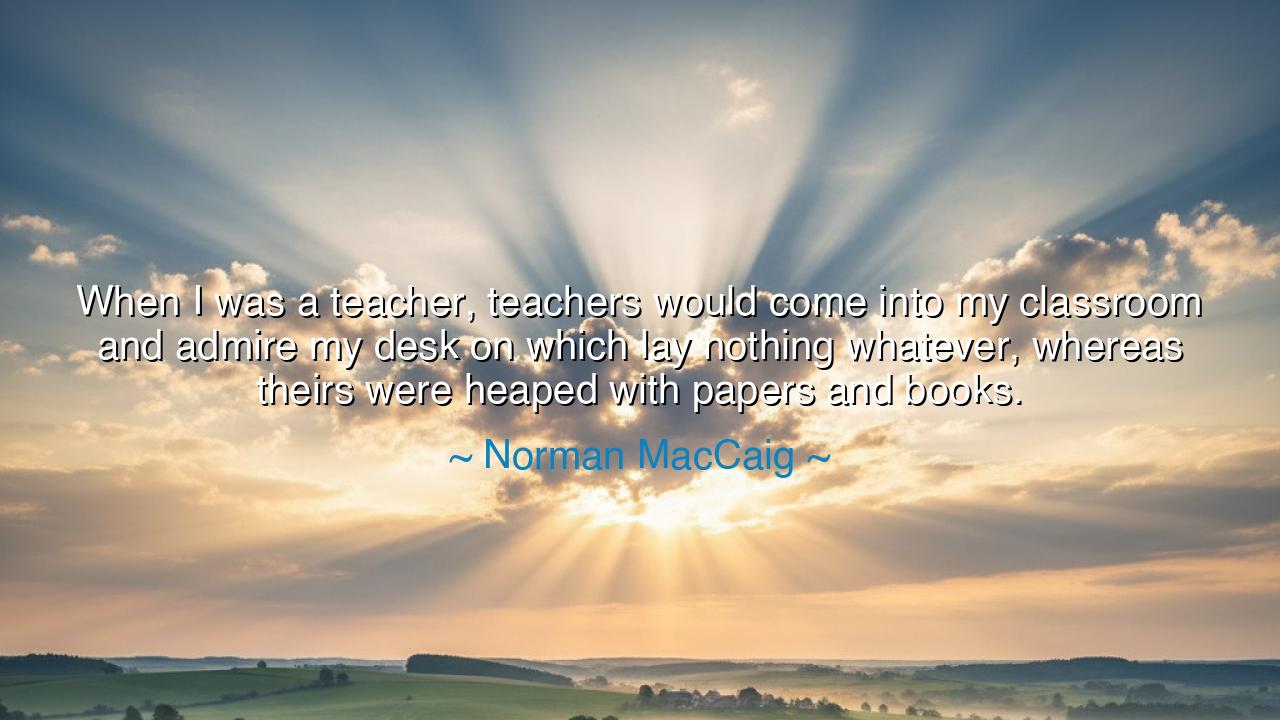
When I was a teacher, teachers would come into my classroom and
When I was a teacher, teachers would come into my classroom and admire my desk on which lay nothing whatever, whereas theirs were heaped with papers and books.






“When I was a teacher, teachers would come into my classroom and admire my desk on which lay nothing whatever, whereas theirs were heaped with papers and books.” Thus spoke Norman MacCaig, the Scottish poet, whose words carried not only the wit of observation but also the weight of hidden wisdom. In this saying, he reveals more than a simple image of a tidy desk. He reveals a philosophy of life, a way of being that values clarity over clutter, essence over excess, stillness over noise.
The meaning of the quote lies in the contrast between emptiness and burden. The other teachers had desks crowded with papers, books, and endless tasks, as though their lives were consumed by the weight of work. But MacCaig’s desk was bare. It was not laziness, but discipline; not neglect, but focus. The emptiness of his desk symbolized a mind unburdened, a spirit free to think, to see, to create. For in that space, he could give attention not to clutter, but to the living reality of his students, and beyond that, to the larger truths that would shape his poetry.
This wisdom is not new, but ancient. The Stoics of Greece and Rome spoke of the need to clear the mind of distractions, for only in simplicity can truth emerge. The Zen masters of Japan, too, kept their surroundings spare, knowing that too many things cloud perception. A bare desk is not only a piece of furniture—it is a metaphor for a soul that has learned to distinguish between the essential and the trivial. MacCaig, in his humble way, lived this truth, and in doing so, taught by example that sometimes nothing is more powerful than everything.
History also offers us an illuminating mirror. Consider the life of Leonardo da Vinci, whose genius flowed not from endless piles of reference books, but from an uncluttered mind open to the world. His notebooks, though famous, were not filled with the redundant, but with direct sketches, fresh insights, and immediate wonder at what he observed. His greatness did not come from burying himself beneath volumes, but from seeing clearly what lay before him. MacCaig’s empty desk carries the same message: wisdom is not in accumulation, but in perception.
Yet there is also a subtle rebellion in his words. For in the world of teaching, a cluttered desk might be seen as a badge of honor—a sign of busyness, of diligence, of importance. But MacCaig reminds us that busyness is not the same as depth. To pile high the symbols of labor is not to guarantee wisdom. True teaching, like true art, comes from presence, clarity, and freedom. The admiration of his colleagues for his empty desk was in truth an unspoken recognition of their own burden, a longing for the simplicity they had lost.
The lesson for us is profound: clear the clutter, both outward and inward. Do not mistake the weight of tasks for the depth of purpose. A mind filled with noise has no room for insight. A life crowded with distractions has no space for joy. Follow MacCaig’s example: make your desk bare, your heart open, your spirit free to see the world as it is. For in simplicity lies strength, and in emptiness lies the possibility of creation.
Therefore, dear listener, let this teaching be your guide. In your work, in your home, in your mind—learn to strip away what does not matter. Do not glory in piles of papers or in endless lists that weigh you down. Instead, glory in clarity, in focus, in freedom. For when the desk of your life is bare, then you will have space enough to notice the beauty of the world, to give your full attention to others, and to create something that endures beyond the fleeting clutter of the moment. In this way, MacCaig’s empty desk becomes not a symbol of absence, but a monument to presence.






AAdministratorAdministrator
Welcome, honored guests. Please leave a comment, we will respond soon